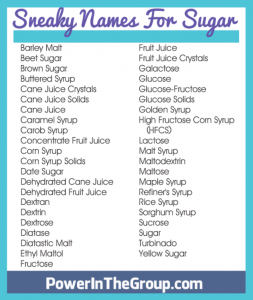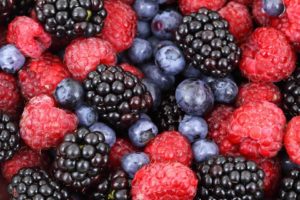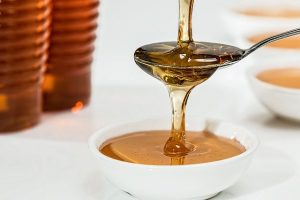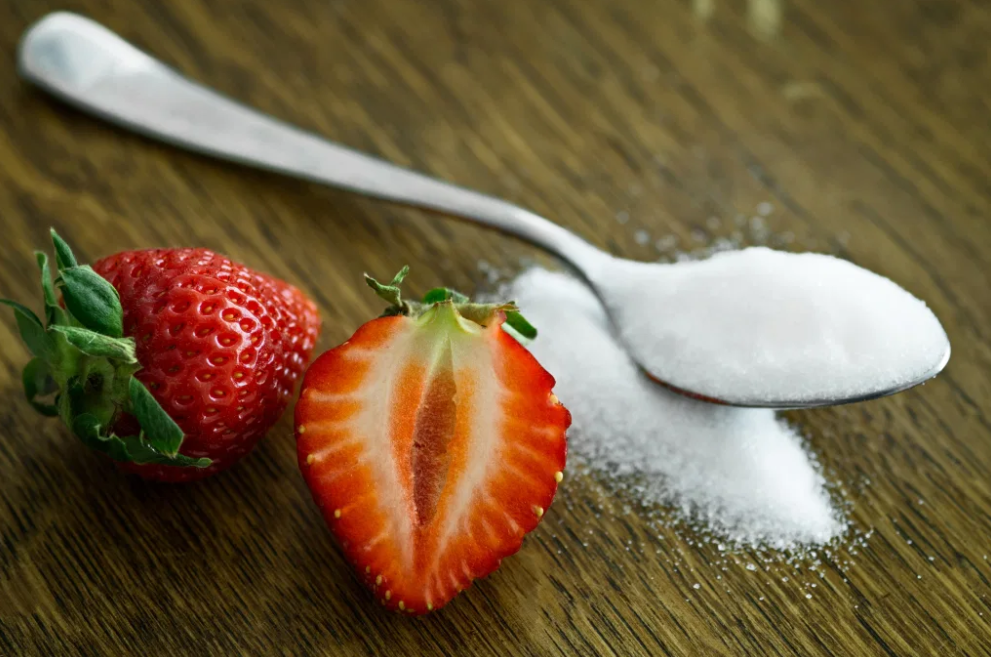Sugar is a term used to describe simple carbohydrates found in foods like fructose, lactose and glucose. All forms of sugar are converted to glucose in the body to use for energy. Sugar has 4 calories per gram, but does it matter where it comes from? Sugar is sugar, right? To some extent this is true but let’s look a little deeper.
Refined Sugar vs Unrefined Sugar vs Natural Sugar
Refined sugar comes from sugar cane or sugar beets that have been highly processed to extract the sugar. Here is a great list of refined sugars from PowerInTheGroup.com.

Unrefined sugar is raw and unprocessed, so it retains its nutritive value. It contains sugar but also water, fiber, enzymes, vitamins and minerals. Examples of unrefined sugar are honey, maple syrup and molasses.
Natural sugars are the sugars found naturally in foods and come with eating that food, like fruits and dairy.
 Many people, especially the high fructose corn syrup manufacturers, want you to believe that sugar is sugar no matter where it comes from. This is true to some extent but there is a twist. When you consume refined sugar (list above) it absorbs into your body very quickly. This causes blood sugar levels to rise rapidly and then the body releases tons of insulin to compensate. This is hard on your body and digestive system. In addition, you are left feeling unsatisfied and are hungry shortly after. Unrefined sugar like honey or natural sugars in foods like fruits are lower in fructose and contain fiber and trace minerals. It’s processed and absorbed more slowly by the body than refined sugar.
Many people, especially the high fructose corn syrup manufacturers, want you to believe that sugar is sugar no matter where it comes from. This is true to some extent but there is a twist. When you consume refined sugar (list above) it absorbs into your body very quickly. This causes blood sugar levels to rise rapidly and then the body releases tons of insulin to compensate. This is hard on your body and digestive system. In addition, you are left feeling unsatisfied and are hungry shortly after. Unrefined sugar like honey or natural sugars in foods like fruits are lower in fructose and contain fiber and trace minerals. It’s processed and absorbed more slowly by the body than refined sugar.
This means longer-lasting energy and a lower rise in blood sugar, which is easier on your body and digestive system.
So, YES, it matters where it comes from.

- You want to choose sugar that is going to provide other benefits like fiber, vitamins and minerals.
- You want a sugar that is easy on the digestive system and your body. So, always choose unrefined sugar like honey, molasses and maple syrup over refined sugars like the ones listed above.
- Eat fruit which has natural sweetness as a snack instead of a processed energy bar. The twist? Once sugar is in your blood stream your body doesn’t know where it came from. Sugar manufacturers want to use this to prove their refined sugar is okay when it really is not because the way it is metabolized DOES matter.
So What About Artificial Sweeteners and Sugar Alternatives?
There are a few FDA approved artificial sweeteners: saccharin, acesulfame, aspartame, avantame, cyclamate, neotame, neohesperidin, and sucralose. These are chemicals that are used as a substitute for sugar to sweeten foods. They provide zero calories because the body can’t break them down. The goal in using artificial sweeteners is to lose weight by calorie reduction. There is heated debate about whether they are helpful or harmful. It is my professional opinion that they are more harmful than helpful. Under no circumstances should human beings consume man-made chemicals to replace anything in our diets.
Sugar alternatives are becoming more and more popular. These alternatives have a low glycemic index or no glycemic index. Some are calorie free and are they mostly plant based. The purpose is to reduce calorie intake and weight. I preferred these alternatives over the sugar substitutes mentioned above because they are naturally derived. So, if you are looking to cut calories or reduce your sugar intake, chose these.
- Stevia
- Chicory root
- Allulose
- Boca Sweet

- Erythritol
- Inulin
- Just Like Sugar (from chicory root)
- Lakanta maple flavored syrup
- Luo han guo
- monk fruit
- Xylitol
- Yacon syrup
Final Thoughts
The Standard American Diet or SAD is very high in sugar whether refined or unrefined. We need to find ways to reduce sugar in our diets. This is very difficult considering that food manufacturers add lots of sugar into the foods we eat. Therefore, it is more important than ever to eat real, whole, unprocessed foods for the majority of your diet. When choosing packaged foods, choose minimally processed foods with NO ADDED SUGARS. Added sugar is the worst ingredient in the SAD and can cause serious damage to our health. Humans are not meant to consume this much sugar and it has been linked to cancer, heart disease, obesity and diabetes. So, choose unrefined sugar, natural sugar and sugar alternatives over the others. A combination or these to reduce calories, weight and overall sugar intake is a good idea.
 Anita Wallak is a Registered & Licensed Dietitian. She has her Master’s degree in Nutrition and has worked in the field of nutrition for 20 years. She is a member of Dietitians of Integrative & Functional Medicine and a member of The American Dietetic Association. Anita is a wife, mother of two, and on a mission to end the “business” of dieting. She offers permanent solutions to the dieting rollercoaster.
Anita Wallak is a Registered & Licensed Dietitian. She has her Master’s degree in Nutrition and has worked in the field of nutrition for 20 years. She is a member of Dietitians of Integrative & Functional Medicine and a member of The American Dietetic Association. Anita is a wife, mother of two, and on a mission to end the “business” of dieting. She offers permanent solutions to the dieting rollercoaster.
The views, thoughts and opinions expressed by our writers
belong solely to them and do not represent
LKNConnect.com, its publisher or its staff.



